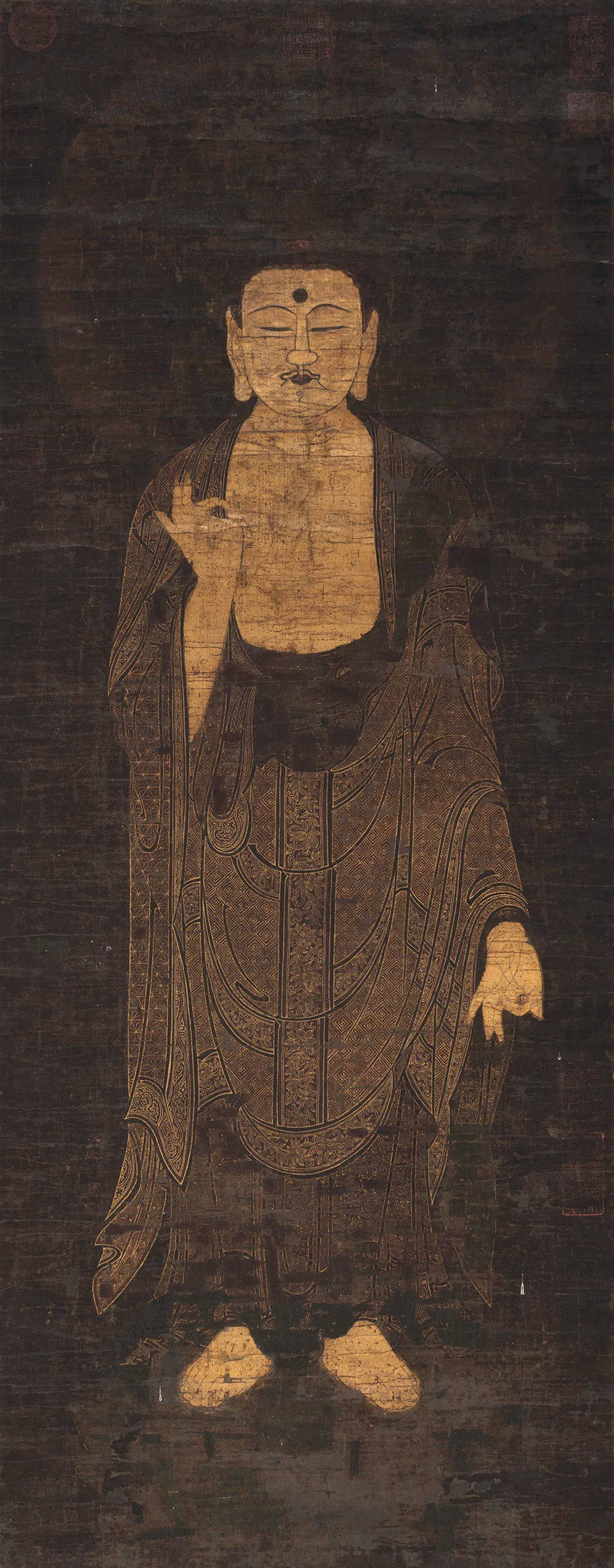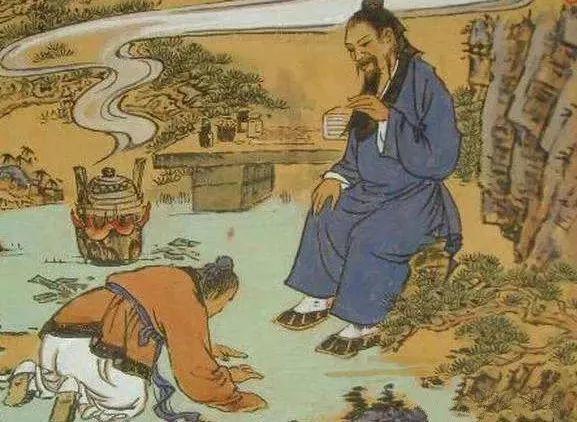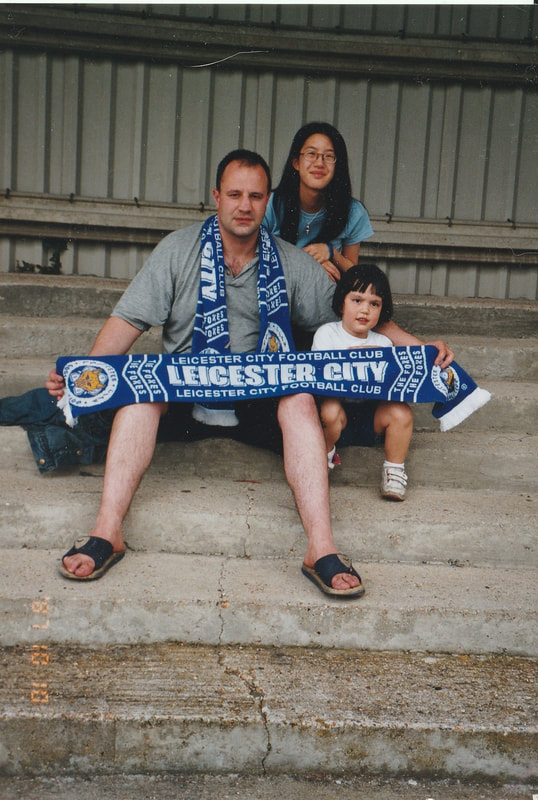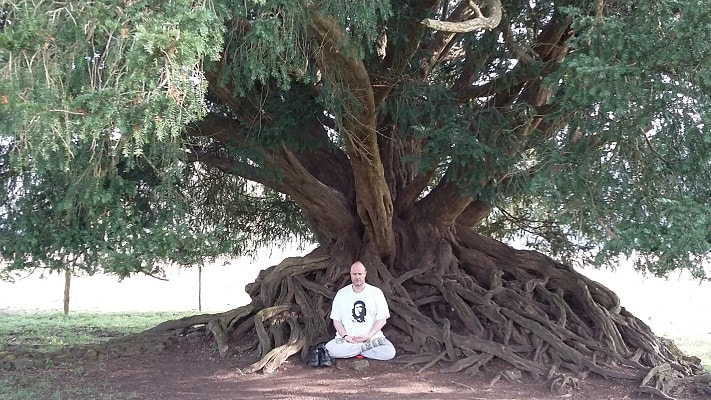|
Chinese Ch'an is the method of permanently altering one's perception. This is achieved by changing 'how' and 'where' the individual places their 'attention'. The default setting for human-beings - which is linked to the evolutionary drive to survive - requires the general attention to be fixed upon the sensing of permanent (external) stimuli - as mediated through the six sense-organs. Modern science, of course, informs us that there are many more than just the assumed 'five' senses in the West (perhaps as many as 'thirty') - but these further senses are in fact specific aspects (or elements) of perception - and easily fall within the Buddha's schematic of defining the 'mind' as a 'sense'. Human ancestors had to be acutely 'aware' of their surroundings if their chances of survival were to be enhanced. After the development of the human mind, body and environment - settled human culture allowed individuals to contemplate their existence. As much of this is speculative in nature - it falls under the subject of religion and spirituality - with the modern trend involving secularised conspiracy theories. The point is that there are many 'external' places (the 'guest' position) where individuals are able to place their awareness. It does not matter what belief system sustains this 'externality' - as the 'guest' position is NEVER left. The Chinese Ch'an tradition offers a methodology to alter, shift and change this orientation. Chinese Ch'an does this by transitioning the default setting of human perception away from the 'guest' position - and toward the 'host' position. The 'host' position is comprised of the empty essence that underlies ALL perception. Therefore, it does not matter where an individual lives, when an individual lived - or the culture that defines the prevailing material conditions - the empty mind ground will ALWAYS underlie whatever physical structures the conditioned elements construct. Today, many spiritual schools are content to pursue a material path that encourages adherents to become attached to this or that outward manifestation - often for a large fee! Being 'attached' to whatever form of externality that takes your attention is not difficult and you certainly do not need another's permission or guidance to attain it. This is why a genuine Ch'an teacher is often unpopular in the world of material externality - as he or she continuously speaks and acts from the 'host' position. The genuine Ch'an teacher is a beacon of stable hope in a sea of changing uncertainty - as was the example of Master Xu Yun (1840-1959). In the meantime, words, silence, actions, and inactions - all serve to turn the adherent's attention BACK (inward) toward the empty essence of ALL material experience. If you are looking for the confirmation of your existing views and opinions (the 'guest') - then you have come to the wrong place. There are many 'businesses' out there that will sell you a robe and an ordination certificate. How's that for unpopularity?
0 Comments
Sitting-up with neck and back support in a comfortable chair can be useful - but lying down is just as good. Posture can involve any relevant position that you need rather than conformity to a universal standard. The Buddha talks of standing, walking, sitting and lying-down (he died lying on his right-side). The point is that a posture should allow an individual to 'forget' about the body. Pain is one of the three stages of sensation mentioned by the Buddha - together with 'pleasure' and 'neurality'. A convenient meditation posture should generate either a relaxed 'pleasure' or an indifferent 'neutrality' to the body. However, pain has the ability to 'breakthrough' any indifference being cultivated - until the 'indifference' becomes stronger than the pain. If you focus on 'Who is hearing?' and attempt to return all that is heard back to its non-perceptual essence - then the empty mind ground will be revealed. If a single sense can be 'returned' in this manner, then ALL of the other five senses (smell, touch, sight and touch) will automatically be returned generating a permanent unity of inner vision. Gone will be the duality that separates mind, body and environment. When this is achieved, pain is transformed into a distant 'drop' of water falling into the ocean...
Many people are surprised to learn that Master Xu Yun (1840-1959) was subject to a more or less continuous stream of allegations claiming that he routinely ‘broke’ the Vinaya Discipline and the Bodhisattva Vows. These assertions were usually made by common people with an axe to grind for some reason or other. The fact that no one took these allegations seriously is simply because no one who mattered believed any of it to be true. Master Xu Yun was accused of seducing young girls and women, as well as pursuing homosexual relationships with young monks. When these reports were found to be groundless – Master Xu Yun was accused of amassing money and using it to lead a life of luxury and leisure! Again, no evidence was ever found and so these allegations were ignored like all the others. When he was married (in his late teens) Master Xu Yun never touched his two wives. Years later, this was confirmed by these (now elderly) ladies who had become ordained Buddhist nuns after their husband left to become a monk around 1858. These ladies were virginal when they entered the Buddhist nunnery. My personal experience of Chinese monastic communities, as well as from the memories of other Western people who also lived as a Buddhist monk in China, confirm that homosexuality (as well as any type of sexual expression) was not present. This is because the facility of human desire is ‘turned inward’ and transmutated into pure spiritual light and energy that emanates from the centre of the forehead and from there permeates the entire body and environment. This process detaches sexual energy from the sexual organs and diverts the imagination of the mind away from sexual fulfilment through the sexual organ, focusing on ‘returning’ all this sensation back toward the empty mind ground. There is no outward sexual reaction or perversion within the average Chinese Ch’an monastery because the subject-object dichotomy that drives the sexual drive within delusive society no longer exists. There is a point in this process where the sexual drive is transformed forever regardless of circumstance. Although a conducive environment is beneficially to start with, eventually, once the six senses are permanently ‘purified’ and ‘cleansed’, then a lay-men such as Vimalakirti and Hui Neng (prior to the latter’s eventual ordination) where able to live within ordinary society and yet never break their Vinaya Discipline. Vimalakirti had a number of wives and numerous children – and yet the Buddha stated that he ‘never’ broke the vow of celibacy. Vimalakirti also criticised the Buddha’s ordained disciple Upali (a Master of the Vinaya Disciple) for being attached (in the wrong) way to the ‘letter of the law’. Vimalakirti stated that being ‘attached’ to celibacy in such a one-sided manner was as bad as being mindlessly attached to sexual pleasure! The answer is that ‘pleasure’, ‘pain’ and ‘neutrality’ are all perceived to be equally ‘empty’ of any and all permanent reality. All emerge from the empty mind ground as karmic attributes that simply take the form that is implicitly conditioned within each strand of expression. This Mahayana penetrating of all phenomena is very different to Upali’s Hinayana notion of just avoiding ‘pleasure’, etc. It is the same for ‘praise’ and ‘blame’, as both are equally ‘empty’ of any intrinsic or separate value. A practitioner who has penetrated the empty mind ground exists in a permanent state of divine indifference and are unmoved by either praise or blame. Reacting to the ignorance of others with the same ignorance does not happen because it cannot happen. Once the empty mind ground has been permanently penetrated, understood and integrated with, then there is never any slipping back to a more deficient position of understanding. People who operate through the ego are continuously attempting to make some kind of social gain through manipulating those around them. A Ch’an Master sees this straightaway and reveals the underlying reality of those who approach with ulterior motives. All is wisdom, loving kindness and compassion.
I respect the Theravada School and have trained with its monks and nuns many times. I admire its Dhamma and work to protect and preserve it in Sri Lanka, Thailand and Myanmar, etc. However, there are certain differences of view which I wish to explore (although in my own training, I see no difference). The Theravada view (for many but not all) is that the senses are purified when the body (and mind) is removed from direct contact with a polluting environment (such as when entering a forest temple or monastery, etc). Only a monastic can purify their minds fully, with a lay man purifying his mind to a lesser degree than the average monastic, but certainly more so than a lay woman. The Ch’an School rejects this view. As the empty mind ground underlies ALL phenomenal existence, the idea that only monks (or nuns) can fully realise it does not hold, and is contradicted by the numerous examples of enlightened lay men and women in the Pali Suttas, and the Ch’an tradition (including children) within China (Vimlakirti is perhaps the greatest Indian example), but what does this difference mean in reality? The Theravada method suggests that enlightenment - I.e. the uprooting of greed, hatred and delusion – is dependent upon circumstance and is only possible if an individual is ‘removed’ from direct contact with the ordinary world. Then, the corrupting influence of the three taints diminishes and eventually falls away (as all stimulus ceases). However, should such an individual be plummeted back into the ordinary world, then this deluded mechanism would re-active and the mind be yet again consumed by greed, hatred and delusion. The Ch’an method ensures that whilst living in isolation, or at least relative peace for a while, the mind calms to a considerable degree so that the hua tou and gong-an methods can ‘return’ ALL sensory stimulus back to the empty mind ground from which it originated. Once the hearing has been returned, all the other five senses are also returned, and the empty mind ground fully penetrated and realised. This experience automatically ‘purifies’ the six senses in a permanent manner that cannot ever be re-corrupted. This is why the Ch’an School advocates the ‘Ch’an Week’, or periods of intense meditative activity interspersed with weeks (or months) of quite ordinary and mundane activity. This explains why many Ch’an monastics either return to lay life to spread compassion and wisdom throughout society, or hold office or other positions within the lay world as monastics with no problem whatsoever. It makes no difference where their expedient body resides, as the six senses have been fully imbued (and transformed) through the presence of a pervasive and all-embracing ‘emptiness’ which is as purifying as it is compassionate and full of loving kindness. This reality further explains why many Ch’an practitioners refuse to ordain in China, as there is no need to do so.
|
Archives
March 2024
Categories
All
|












 RSS Feed
RSS Feed